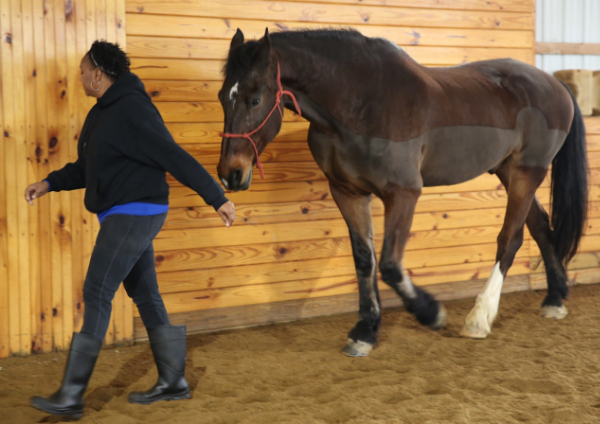Horse Power: Veterans Find Resilience in Equine Experiences

Horses don’t lie. They reflect your energy and let you know where you stand right away. It’s no wonder they have become partners in healing — sometimes developing second lives as assistants to veterans managing post-traumatic stress disorder (PTSD) and other issues.
Army veteran Angela Harrison found herself face to face with that honesty. It came in the form of a racehorse named Pumpkin, who selected Angela from a group of other veterans.
“That horse came to me because it had been through something similar to what I was going through,” Angela said. “I was dealing with a lot and had people who depended on me. At that moment, I was feeling frustrated about not being able to do as much as I used to. I believe Pumpkin felt my mental state. As a former racehorse, she had been so powerful and such a leader. Now she felt she couldn’t do the same things she used to. I identified with her.”
Wounded Warrior Project® (WWP) offers veterans the opportunity to experience the healing power of horses in an open space with fellow veterans.
This experience can be part of a WWP single-day connection event or through the nonprofit’s mental health program, Project Odyssey®, which uses adventure-based learning to help warriors manage and overcome their invisible wounds. Organizations that partner with WWP usually facilitate the interactions.
Learn more about WWP's mental health services for veterans.
“Horses are known to reflect the emotion of the individual interacting with it, and that can be a powerful takeaway for participants,” said Ryan Kules, director of WWP’s Project Odyssey program.
Through equine-assisted services, warriors and their family members learn skills they can take home to improve their daily lives.
The Transforming Power of Horses
Marine veteran Carolyn Nelson can attest to this impact. She is a WWP warrior who went from transitioning veteran to horsemanship professional and now helps introduce other veterans to horses. A New York native, she went back to school in her 40s at SUNY Cobleskill’s equine studies program — after completing a master’s degree in business while still active duty. She taught high school after separating from the military, but it wasn’t until she experienced equine-assisted services that she found new purpose.
“Two years ago, I couldn’t talk to you this openly,” she recalled. When Carolyn struggled with her transition out of the military, her husband, also a former Marine, encouraged her to find help after he tried equine-assisted services through a nonprofit’s program for veterans. Carolyn tried two different programs and recognized a powerful shift in her perspective. She wanted other wounded warriors to share that experience.
“In the military, I was always thinking about that ‘next thing’ I was going to accomplish,” Carolyn said. “Now I have goals for the horses, students, and what is next to better myself and my family relationships. I had lost sight of that, and the horses help me reconnect and remain in the present.”
In 2020, Carolyn graduated with a degree in therapeutic horsemanship, and she’s also an equine specialist in mental health and a riding instructor. She stayed with the SUNY Cobleskill therapeutic horsemanship veterans’ program as a manager and a grant writer. Her goal is to make “equine-assisted services as free as possible to all participants.”
“I joined the military to belong to something greater than myself, and I’ve been able to do that again through equine programs. This line of service drew me in because it’s therapeutic, but it’s not therapy — you’re doing a lot of self-evaluation when you interact with horses. They provide candid feedback. It’s a humbling and amazing experience.”
Carolyn said she now gets to work on something that “doesn’t feel like work.” She introduces other veterans to equine-assisted services, including fellow wounded veterans through WWP.
That was the case for Jorge Riveros, a Marine veteran who drove to SUNY Cobleskill from Long Island with his family to experience the power of being around horses. “I believe all animals are therapeutic by default,” Jorge said. “With horses, I’ve always felt that it’s fulfilling just taking care of them. They’re such big and powerful animals, yet they need feeding, grooming, and care from us. It’s great to share this environment with your family.”
Angela, who drove three hours to participate in a recent workshop Carolyn led, has this to say to fellow veterans: “A horse can seem to be a threatening animal because it’s so big, but just know that they feel the way you feel, and they go through the same things because we’re all in this thing called life. Don’t be afraid.”
June is PTSD Awareness Month. WWP offers mental health services for veterans and families coping with the invisible wounds of war. Get connected today or read more about how WWP helps.
Contact: Raquel Rivas — Public Relations, rrivas@woundedwarriorproject.org, 904.426.9783
About Wounded Warrior Project
Since 2003, Wounded Warrior Project® (WWP) has been meeting the growing needs of warriors, their families, and caregivers — helping them achieve their highest ambition. Learn more.